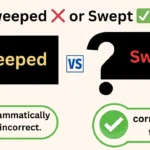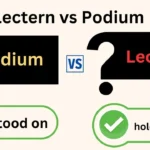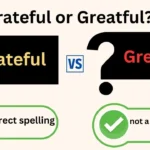Ever found yourself puzzled over whether to say “woke up,” “waked up,” or “woken up”? You’re not alone.
Many English learners and even native speakers often grapple with these variations. Understanding the correct usage of these forms can significantly enhance your communication skills and ensure your sentences are grammatically correct.
Use “woke up” for simple past tense and “woken up” for perfect tenses; avoid “waked up” in standard English.
This article aims to clarify the differences and provide comprehensive guidance on when and how to use each form correctly.

The Verb “Wake” and Its Conjugations
The verb “wake” is commonly used to describe the act of becoming conscious or making someone else conscious from sleep.
It’s a versatile verb with several conjugations that can be tricky to master.
Conjugation Chart
Here’s a quick look at the different forms of “wake”:
| Tense | Verb Form | Example Sentence |
| Base Form | wake | I wake up early every day. |
| Simple Past | woke | She woke up at 6 AM yesterday. |
| Past Participle | woken | They have woken up late recently. |
| Present Participle | waking | He is waking up the kids now. |
Present Tense Forms
Simple Present
In the present tense, “wake” and “wakes” are used. The form changes depending on the subject.
- Wake: Used with I, you, we, they.
- Wakes: Used with he, she, it.
Examples:
- I wake up at 7 AM every day.
- She wakes up early for her morning run.
Present Participle
The present participle form “waking” is used to indicate an ongoing action.
Examples:
- I am waking up early these days to exercise.
- He is waking up his brother for school.
Simple Past Tense
The simple past tense form is where confusion often arises. The correct form is “woke up,” while “waked up” is generally incorrect in standard American English.
Common Confusion: “Woke Up” vs. “Waked Up”
Examples:
- Correct: She woke up feeling refreshed.
- Incorrect: She waked up feeling refreshed.
Perfect Tense Forms
Present Perfect
The present perfect tense uses “woken up” to describe actions that occurred at an unspecified time before now.
Examples:
- I have woken up late every day this week.
- They have woken up to the importance of good health.
Past Perfect
The past perfect tense also uses “woken up,” typically indicating that the action was completed before another past action.
Examples:
- By the time the alarm rang, she had already woken up.
- He had woken up before the sun rose.
Contextual Examples
Understanding the usage of these forms in context can solidify your grasp on their correct application.
Narrative Examples
- Waking Up: Every morning, as the sun began its ascent, John found himself waking up to the gentle chirping of birds.
- Woke Up: Yesterday, I woke up to the sound of heavy rain pounding on the roof.
- Woken Up: By the time they reached the campsite, everyone had woken up and was ready for the adventure.
Dialogues
- Wake: “Do you wake up early every day?”
- Woke: “Yes, I woke up at 5 AM today.”
- Woken: “I have never woken up this early before.”
The Role of Transitivity
Explanation of Transitivity
Transitivity in verbs refers to whether a verb can take a direct object. The verb “wake” can be both transitive and intransitive.
- Transitive: When the verb takes a direct object.
- Example: She woke the baby up.
- Intransitive: When the verb does not take a direct object.
- Example: She woke up early.
Examples
Transitive Usage:
- He woke the children up for school.
- She woke him up with a gentle nudge.
Intransitive Usage:
- They woke up at dawn.
- He wakes up with the sunrise.
Common Errors and How to Avoid Them
Error Analysis
Understanding common mistakes can help prevent them. Here are some typical errors with “woke up,” “waked up,” and “woken up”:
- Using “waked up” instead of “woke up”:
- Incorrect: I waked up late.
- Correct: I woke up late.
- Using “woken up” incorrectly:
- Incorrect: She has waked up early today.
- Correct: She has woken up early today.
Correction Tips
- Remember the Simple Past:
- Always use “woke up” for simple past tense.
- Example: He woke up at 7 AM.
- Perfect Tenses:
- Use “woken up” for perfect tenses.
- Example: They have woken up every morning at dawn.
Real-Life Usage
Literature Examples
Literature often provides excellent examples of verb usage. Here are a few from well-known works:
- “She woke up to the sound of the wind howling through the trees.” – Unknown
- “By the time he had woken up, the house was empty.” – Unknown
Media Examples
Popular media also showcases these verbs in context:
- Movies: “I woke up in the middle of the night to find the house quiet.”
- Songs: “I’ve never woken up so early in my life.”
Conclusion
Mastering the conjugations of “wake” can greatly improve your clarity in communication.
By understanding when to use “woke up,” “woken up,” and avoiding “waked up,” you can ensure your sentences are grammatically correct and easily understood.
Final Tips:
- Practice Regularly: Incorporate these forms into your daily conversations and writing.
- Read Widely: Exposure to different contexts helps solidify understanding.
- Seek Feedback: Engage with others to refine your usage.
Additional Resources
Useful Links
- Grammar Girl: Woke vs. Woken
- Merriam-Webster: Conjugation of Wake
Further Reading
- Books:
- The Blue Book of Grammar and Punctuation by Jane Straus
- Understanding and Using English Grammar by Betty S. Azar

As an experienced English teacher, I’m Jessica Thompson, here to make grammar and vocabulary simple and fun. Join me on TalkSpeaker as we explore the language together, one lesson at a time!



